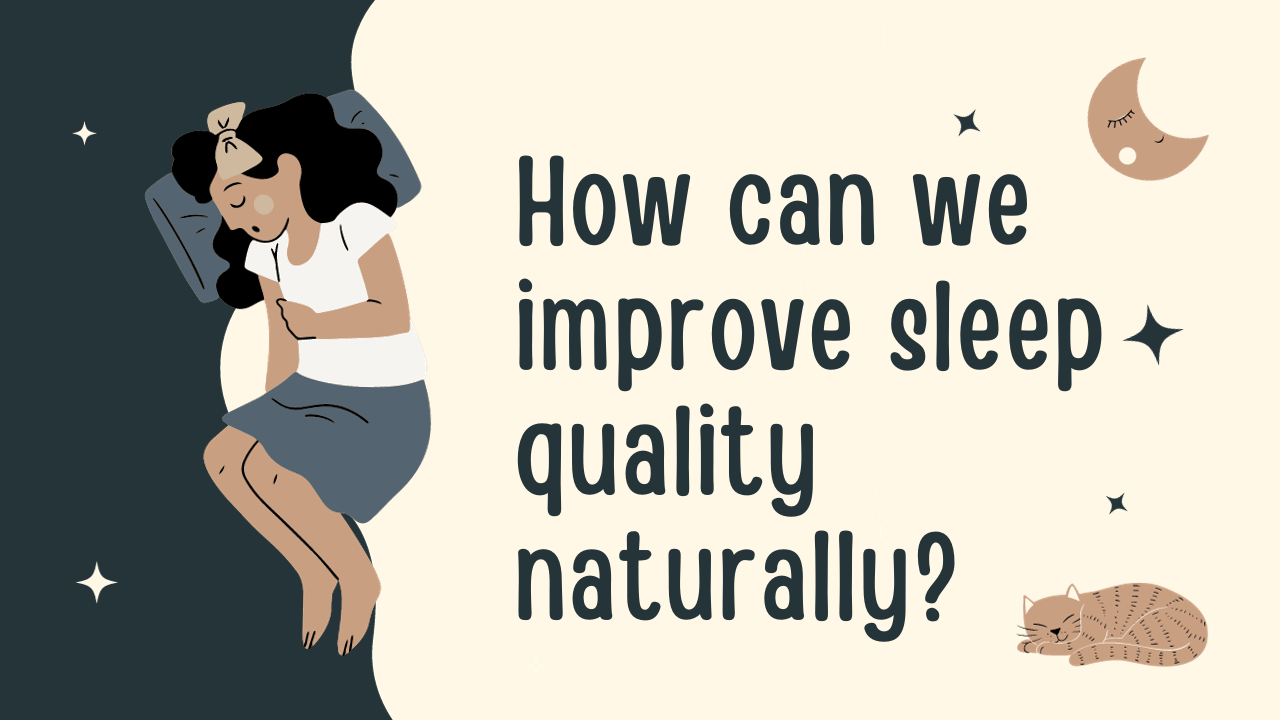In this article we will discuss how can we improve sleep quality naturally lets go.
Welcome to the land of dreams, where unicorns frolic and sheep jump over moonlit fences. Oh wait, that’s not quite right.
In reality, many of us struggle to achieve a good night’s sleep filled with peaceful dreams and restful slumber. But fear not! Today, we will unlock the secrets to improving your sleep quality naturally.
Sleep is not just a luxury or an indulgence but an essential pillar for our overall health and well-being. It’s like the magical potion that rejuvenates our body and mind, allowing us to wake up feeling refreshed and ready to conquer the world (or at least take on the morning commute).
But alas! Many factors can disrupt this natural rhythm of blissful slumber. From stress-induced tossing and turning to late-night Netflix binges that leave you counting episodes instead of sheep, these common culprits often stand in the way of achieving those elusive eight hours of uninterrupted shut-eye.
So, how can we reclaim our nights from restless thoughts and find solace in deep relaxation? Fear not, weary-eyed friends – we have some tried-and-true natural remedies up our sleeves. Let’s dive into them now!
The importance of sleep for overall health and well-being
Sleep is not just a state of unconsciousness that consumes a significant portion of our lives; it is a fundamental pillar for our overall health and well-being.
You see, while we sleep away in dreamland, our bodies are rigid at work repairing damaged cells, boosting immune function, and replenishing energy stores. It’s like hitting the reset button on our physical and mental systems.

Lack of sleep can wreak havoc on both our physical and mental health. The QuillBot paraphraser modifies your sentences, allowing you to swiftly and effectively rework and rephrase your content! Obesity, diabetes, cardiovascular disease, and specific forms of cancer are among the health conditions associated with these factors.
Conversely, getting enough quality sleep can help regulate appetite hormones, maintain a healthy weight, and improve cognitive function and concentration levels throughout the day.
But it’s not just about quantity; quality matters, too! We’ve all had those nights where we toss and turn or wake up feeling groggy despite logging in enough hours.
That’s because uninterrupted deep sleep cycles allow your body to go through its natural restorative processes.
In addition to improving your physical health, good sleep habits also contribute to emotional well-being.
Have you ever noticed how cranky you feel after a night of tossing around like a restless dolphin?
Sleep deprivation has been closely associated with mood disorders such as anxiety and depression. On the other hand, (or pillow), getting adequate shut-eye can enhance your mood stability and promote overall emotional resilience.
So, my friends, let us not underestimate the power of slumber! Prioritize your beauty rest for better overall health physically refreshed bodies ready to take on whatever challenges lay ahead mentally sharp minds capable of brilliance when needed most.
Common causes of poor sleep quality
Poor sleep quality can significantly impact our overall health and well-being. Several common causes can interfere with our ability to get a good night’s sleep.
One of the main culprits is an irregular sleep schedule. When we go to bed and wake up at different times each day, it disrupts our body’s natural rhythm, making it harder for us to fall asleep and stay asleep.
Another factor contributing to poor sleep quality is a lack of comfort in our sleep environment. If your mattress is old and lumpy, or your bedroom is too hot or noisy, it can make it difficult to relax and drift off into a deep slumber.

The widespread use of electronic devices before bedtime is a significant contributor to reduced sleep quality.
The hormone melatonin, responsible for regulating the circadian rhythm, can be inhibited by the exposure to the blue light emitted by electronic devices such as laptops, tablets, and smartphones.
Insufficient engagement in physical exercise throughout the day can potentially impact the nocturnal sleep quality experienced by individuals.
Research has demonstrated that engaging in regular physical activity has a positive impact on sleep quality through the reduction of stress levels and the promotion of relaxation.
Stress and anxiety are also significant contributors to poor sleep quality. Racing thoughts and worry can keep us awake at night, preventing us from getting restorative rest.
To improve your chances of the getting high-quality sleep naturally, addressing these joint causes head-on is essential.
By the establishing a consistent bedtime routine, creating a comfortable sleeping environment free from distractions, limiting screen time before bed, engaging in regular physical activity during the day, and finding effective ways to manage stress levels, you may be able to enhance your overall sleep patterns without relying on medication or supplements.
The integration of relaxation practices, such as meditation or deep breathing exercises, into one’s evening routine may potentially contribute to the soothing of the mind and its readiness for sleep.
Proper attention to these factors makes achieving a more peaceful and rejuvenating sleep experience possible.
Natural ways to improve sleep quality:
Natural ways to improve sleep quality are essential for overall health and well-being. One of the most effective strategies is The implementation of a regular sleep routine.
Maintaining a consistent sleep schedule by adhering to regular bedtimes and wake-up times aids in the regulation of the body’s circadian rhythm, facilitating the process of falling asleep and awakening feeling rejuvenated.
Creating a comfortable sleep environment is another crucial aspect. Keep your bedroom calm, dark, and quiet to promote better sleep. Investing in quality mattresses, pillows, and bedding can also enhance comfort levels.
It is imperative to restrict screen time prior to bedtime due to the emission of blue light by electronic devices, which has the potential to interfere with the generation of melatonin, the Alternatively, individuals may opt to engage in recreational activities such as reading literary works or immersing themselves in calming audio experiences.
Regular exercise has been shown to improve sleep quality as it reduces anxiety and promotes relaxation. However, avoid exercising too close to bedtime as it may energize you instead.
Relaxation methods including meditation and deep breathing exercises can help calm the mind and prepare your body for restful sleep. Taking a few moments each night before bed to practice these techniques can make a significant difference in improving sleep quality.
Certain foods and drinks can aid in better sleep, too. Herbal teas like chamomile or valerian root have natural soothing properties that promote relaxation.
Additionally, incorporating foods rich in tryptophan into your evening meal – such as turkey, nuts, seeds, or bananas – may support healthy sleep patterns.
Enhancing one’s sleep quality through natural means necessitates the maintenance of consistent habits and the cultivation of patience.
By incorporating these tactics into one’s daily routine, individuals may experience more rejuvenating nights of sleep and an overall enhancement of their general state of health and wellness.
Establish a consistent sleep schedule.
The establishment of a regular sleep schedule is a crucial element in enhancing natural sleep quality. The human body benefits from adhering to a regular schedule, as establishing consistent bedtimes and wake-up times aids in the regulation of our internal circadian rhythm, facilitating the process of falling asleep and awakening feeling revitalized.
Start by determining how much sleep you need each night. Most adults require between 7-9 hours of sleep, so aim for that range when setting your bedtime. Once you have determined your ideal rest, stick to it as closely as possible, even on weekends.
Consistency is critical here – going to bed and waking up simultaneously every day helps train your body to recognize when it’s time to wind down and prepare for restful slumber.
By creating a regular schedule, you are signaling to your body that it’s time for rest, allowing for more efficient and rejuvenating sleep.
It may take some adjustment initially, but your body will adapt over time, and falling asleep at the designated hour will become easier.
Remember not to force yourself into an early or late bedtime that doesn’t align with your natural rhythm; find what works best for you.
By establishing a consistent sleep schedule, you allow yourself more profound, restorative rest each night. So why not start tonight? Settle into bed at the same time every evening and watch as your overall sleep quality improves naturally!
Create a comfortable sleep environment.
Establishing an optimal sleep environment is crucial for enhancing the overall quality of one’s sleep. The initial measure is ensuring that the bedroom environment is characterized by a state of tranquility, absence of light, and little noise.
This entails the allocation of resources towards the acquisition of blackout curtains or blinds, with the purpose of obstructing external light sources.
If the presence of noise is a concern, it may be advisable to utilize earplugs or a white noise machine as potential solutions to mitigate the impact of undesirable sounds.
Next, pay attention to the comfort of your bed and bedding. A supportive mattress that suits your preferences can work wonders for ensuring a good night’s sleep. Additionally, choose pillows that provide adequate neck and head support.
Keep the temperature in mind as well – most people find a slightly cooler room more conducive to sleeping soundly.
Decluttering your bedroom can also contribute to creating a peaceful atmosphere. Remove any unnecessary items that may cause mental clutter or distractions during bedtime.
Consider incorporating calming scents into your sleep environment with essential oils or lavender-scented products. These fragrances have been shown to promote relaxation and better sleep quality.
By creating a comfortable sleep environment, you are setting yourself up for success when it comes to achieving restful nights of sleep without interruptions!
Limit screen time before bed.
In today’s digital age, it’s hard to escape the allure of screens. We are constantly surrounded by the technology, From smartphones to tablets to laptops and TVs.
While these devices offer convenience and entertainment, they can also wreak havoc on our sleep quality.
What you want altered should go here. After that, click the button below. It’s that simple! This disruption can make falling asleep and staying asleep throughout the night difficult.
To improve your sleep quality naturally, limiting screen time before bed is crucial. Start by setting a specific cut-off time for electronic devices in the evening. Aim for at least one hour before you plan on going to sleep.
Instead of scrolling through social media or binge-watching your favorite TV show, try engaging in relaxing activities. Read a book, take a warm bath, or practice gentle stretching exercises. These calming endeavors will help signal your body that it’s time to unwind and prepare for restful slumber.
If you find it challenging to disconnect from technology entirely, consider using apps or settings that reduce blue light emissions on your devices during nighttime hours. These features can help mitigate some of the adverse effects on melatonin production.
By limiting screen time before bed, you give yourself a better chance of achieving high-quality sleep that leaves you can feeling refreshed and rejuvenated in the morning. So go ahead – power down those screens and prioritize your well-being!
Exercise regularly
Regular exercise is beneficial for physical health and plays a crucial role in improving sleep quality. Regular exercise helps regulate the body’s internal clock, known as the circadian rhythm, which governs our sleep-wake cycle. Engaging in physical activity during the day signals to our body that it’s time to be awake and alert.
In this section, let us know what needs to be fixed. Next, select the paraphrasing option located beneath. The task at hand is straightforward and uncomplicated.
It’s important to note that timing is critical when exercising for better sleep. While any form of physical activity is beneficial, try not to engage in intense workouts too close to bedtime, as this can energize the body. Aim for at least 30 minutes of moderate-intensity exercise, such as brisk walking or cycling earlier in the day.
Incorporating regular exercise into your routine can reap numerous benefits, including improved sleep quality and increased well-being throughout the day. So lace up those sneakers and get moving!
Try relaxation techniques such as meditation or deep breathing.
The implementation of relaxation techniques, such as meditation or deep breathing, has been shown to have a positive impact on enhancing sleep quality in a natural manner.
These techniques have been found to have a calming effect on the mind, leading to a decrease in tension and anxiety levels.
Additionally, they facilitate a state of relaxation that is beneficial to both initiating and maintaining sleep during the entire duration of the night.
Meditation involves focusing your attention on a specific object, thought, or activity to train your mind to attain a state of mental clarity and emotional calm. Regular meditation teaches you to calm your mind and release tension before bed.
Deep breathing exercises are another powerful tool for promoting better sleep. Taking slow, deep breaths activates the body’s relaxation response, which helps lower heart rate and blood pressure while reducing feelings of stress. It’s also increases oxygen flow throughout the body, aiding in overall relaxation.
Incorporating these techniques into your bedtime routine can signal to your figure that it’s time to relax and prepare for sleep. Whether you choose meditation or deep breathing exercises (or both), find a comfortable position in a quiet space where you won’t be disturbed.
Remember that consistency is critical when reaping the benefits of these relaxation techniques. With regular practice over time, you may find yourself experiencing more profound and more restful sleep each night. So why not give them a try? Your mind and body will thank you!
Foods and drinks that can aid in better sleep:
Foods and drinks play a central role in improving sleep quality. Incorporating certain items into your diet can promote relaxation and enhance your ability to fall asleep faster. Here are some options to help you achieve a restful night’s sleep.
Herbal teas such chamomile and valerian root have been used for centuries as natural remedies for insomnia.
Chamomile tea contains apigenin, an antioxidant that binds to specific receptors in the brain, promoting drowsiness and reducing anxiety. Valerian root tea to known for its calming effects on the nervous system, helping you unwind before bedtime.
In addition to herbal teas, foods rich in tryptophan can also aid in better sleep. Tryptophan is an crucial amino acid that helps produce serotonin and melatonin – hormones that regulate sleep patterns. Foods like turkey, chicken, dairy products, nuts, seeds, bananas, and oats are excellent sources of tryptophan.
Moreover! It’s important to note that consuming heavy or spicy meals close to bedtime can disrupt digestion and hinder sleep quality. Therefore,! Opting for lighter snacks is best if you feel hungry before bed.
Lastly,! staying hydrated during the day has numerous benefits, including improved sleep quality.! However,! It’s advisable not to drink excessive fluids right before bed as it may lead to frequent trips to the bathroom during the night.
By incorporating these foods and drinks into your daily routine! You may find yourself drifting off into dreamland more efficiently than ever before!
Herbal teas (chamomile, valerian root)
Herbal teas have been used for periods as natural therapies to promote relaxation and improve sleep quality. Chamomile and valerian root are two popular herbal teas known for their calming properties.
Chamomile tea is the widely recognized for its ability to provide a calming influence on both the physical and mental aspects of an individual.
The substance comprises chemical substances that possess the potential to mitigate anxiety, promote a state of tranquility, and facilitate relaxation.

This characteristic renders it a suitable beverage to be consumed prior to retiring for the night. The addition of the delicate floral fragrance in chamomile tea further enhances its soothing properties.
Valerian root tea is another herbal remedy traditionally used to support better sleep. It contains compounds that interact with receptors in the brain to promote feelings of tranquility and enhance overall sleep quality.
Valerian root tea has a slightly earthy taste, which may take some getting used to, but many people find it beneficial in improving their sleep patterns.
Both chamomile and valerian root teas are caffeine-free, making them suitable choices for those looking to wind down before bed without any stimulants interfering with their sleep. Incorporating these herbal teas into your nightly routine might be the key to naturally achieving a more restful night’s sleep!
Foods rich in tryptophan
When considering methods for enhancing sleep quality in a natural manner, it is imperative to place significant emphasis on dietary factors. Tryptophan is a crucial nutrient that has a significant role in facilitating improved sleep.

Total-Body Fitness: 10 Effective Resistance Band Exercises
Tryptophan is classified as an indispensable amino acid, playing a crucial rol in the biosynthesis of serotonin, a neurotransmitter responsible for the guideline of attitude and facilitation of relaxation inside the hominid body.
Including tryptophan-rich foods in your evening meals or snacks can help enhance your sleep. Some excellent sources of tryptophan include turkey, chicken, nuts and kernels (such as almonds and pumpkin seeds), tofu, cheese, eggs, and bananas.
Turkey has long been associated with causing drowsiness due to its high tryptophan content. However, it’s important to note that the amount of tryptophan alone may not be enough to induce sleep on its own. It should be combined with other factors like a balanced diet overall.
Incorporating these foods into your dinner or having a small snack before bed can give you the necessary tryptophan dose for better-quality sleep.
Remember that consuming these foods as part of a well-rounded diet will also benefit your overall health! So why not give them a try?
Conclusion
The significance of obtaining high-quality sleep should not be underestimated. The aforementioned factor significantly contributes to our comprehensive state of health and welfare, exerting influence on several aspects such as emotional disposition, cognitive abilities, immune response, and physical capabilities.
Nevertheless, a considerable number of individuals encounter difficulties in attaining satisfactory sleep quality, primarily attributable to a multitude of elements encompassing stress and anxiety. an irregular sleep schedule, or an uncomfortable sleeping environment. Fortunately, natural ways to improve sleep can make a significant difference.
The establishment of a regular sleep routine is of utmost importance. Establishing a consistent sleep schedule, wherein one retires and awakens at the same time each day, contributes to the regulation of the body’s internal circadian rhythm and facilitates the development of improved sleep patterns.
Establishing an optimal sleep environment is equally crucial. It is imperative to ensure that one’s bedroom environment is characterized by a state of tranquility, absence of light, and minimal auditory disturbances.
It is advisable to allocate resources towards the acquisition of a mattress and pillows that provide adequate support and align with one’s own preferences.
Restricting the duration of screen exposure prior to bedtime is a crucial factor in enhancing the overall quality of sleep.

Building Strength and Fitness: Calisthenics Workouts for Beginners
The emission of blue light from electronic gadgets has the potential to disrupt the generation of melatonin, so impeding the process of falling asleep.
In lieu of engaging in activities such as browsing social media or watching television prior to sleep, it is advisable to consider alternatives such as reading a book or engaging in relaxation performs such as meditation or profound breathing exercises.
Regular exercise has been proven to enhance both the duration and quality of sleep. Physical activity during the day tires out your body and helps reduce stress levels – two critical factors for achieving restful nights.
Certain food and beverage choices have the potential to facilitate improved sleep quality. Herbal infusions such as chamomile or valerian root include soothing characteristics that facilitate relaxation prior to sleep.
Various food sources are rich in tryptophan, an essential amino acid that acts as a ancestor to serotonin, a neurotransmitter associated with the regulation of mood. Examples of such foods include turkey, chicken breast, nuts, seeds, and bananas.
The consumption of these particular meals has the potential to improve the ability to commence sleep more quickly and maintain sleep for longer durations.
In conclusion,
By implementing these natural strategies into your routine – maintaining a consistent schedule,
creating a cozy sleeping space, saying no to screens close
to bedtime, prioritizing regular exercise, and incorporating
sleep-friendly foods and drinks – you can significantly enhance your sleep quality without relying on medication or supplements
Are there herbal supplements or teas that promote better sleep?
Herbal supplements and teas have been used to promote improved sleep for centuries. These natural remedies can provide a safe and effective alternative to pharmaceuticals for enhancing sleep quality.
One popular herbal tea for promoting sleep is chamomile. This calming herb has long been known for its soothing properties and can help ease anxiety and promote relaxation before bed.
Another herbal option is valerian root, which has been shown to increase levels of GABA in the brain, a neurotransmitter that helps regulate sleep.
Furthermore, there are herbal supplements that are accessible and have the potential to enhance the quality of sleep.
Melatonin is an endogenous hormone that shows a vital role in regulation of the circadian rhythm, which governs the sleep-wake cycle in humans.
The administration of melatonin as a dietary supplement has the potential to recalibrate the circadian rhythm and enhance the overall quality of sleep.
It is crucial to acknowledge that although herbal supplements and teas may offer potential benefits to certain individuals, it is advisable to seek guidance from a healthcare practitioner prior to initiating any novel regimen or incorporating new supplements into one’s routine.
This precaution is particularly important for individuals with pre-existing health conditions or those currently undergoing medication.
Yes, herbal supplements and teas have been found to promote better sleep. However, it’s essential to find what works best for you individually and consult a healthcare professional before incorporating them into your routine.
What are the best relaxation techniques for better sleep?
The implementation of relaxation techniques has been found to have a extensive impact on enhancing the quality of sleep.
Engaging in relaxation techniques for both the mind and body prior to bedtime facilitates the process of falling asleep and maintaining uninterrupted sleep throughout the night. What are some effective relaxing practices that can improve sleep quality?
One effective technique is meditation. By focusing on your breath or repeating calming mantra, you can quiet your mind and release any tension or stress that may keep you awake. Guided meditation apps or videos can be helpful if you’re new to meditation.
Deep breathing exercises are another great option. Taking slow, deep breaths helps activate the body’s relaxation response and promotes feelings of calmness.
You can try inhaling deeply through your nose for a count of four, holding your breath for seven, and exhaling slowly through your mouth for a count of eight.
Progressive muscle relaxation involves tensing and then systematically releasing each muscle group in your body. This technique helps promote physical peace and relieve any muscular tension that might interfere with sleep.
Aromatherapy is also worth considering as a relaxation aid before bedtime. Essential oils like lavender have been shown to promote relaxation and expand sleep quality when used in diffusers or applied topically (diluted with carrier oil).
Yoga is not only the beneficial for physical health but also mental well-being. Practicing gentle yoga poses before bed can help stretch tense muscles while calming the mind.
Everyone is different, so finding which relaxation techniques work best for you may take some experimentation. Consistency is consistency – regularly practicing these techniques will yield more significant benefits.
Incorporating these relaxing practices into your bedtime routine will create an environment conducive to restful sleep making it’s easier to drift off into dreamland naturally!
How can I create a sleep-friendly environment in my bedroom?
Creating a sleep friendly environment in your bedroom is essential for improving the quality of your sleep. Here are some tips to help you make the perfect setting:
1. Keep it cool: Maintaining a cool temperature in your bedroom can promote better sleep. Set your thermostat to a comfortable level, use breathable bedding materials like cotton, and consider using a fan or air conditioner if necessary.
2. Block out unwanted light: Darkness signals to our brain that it’s time to sleep. Invest in blackout curtains or blinds to minimize external light sources that may interrupt your sleep.
3. Reduce noise: Annoying noise can be very troublemaking when trying to fall asleep or stay asleep during the night. Use earplugs, white noise machines, or soothing sounds like rainfall or ocean waves to drown out any disturbances.
4. Create a clutter-free space: A clean and organized bedroom promotes relaxation and tranquility, making unwinding easier before bed.
5. Choose comfortable bedding and pillows: Investing in high-quality mattresses and bedding can significantly improve comfort during sleep.

Remember that everyone’s preferences for their ideal sleeping environment may differ slightly, so feel free to experiment with different settings until you find what works best for you!
Are there natural remedies for reducing nighttime anxiety and stress?
Are there natural remedies for reducing nighttime anxiety and stress?
Several natural remedies can help reduce nighttime anxiety and stress, ultimately improving sleep quality. Here are a few options to consider:
1. Herbal Supplements: Some herbal supplements like lavender, passionflower, and lemon balm have calming properties that can promote relaxation and alleviate anxiety symptoms.
2. Aromatherapy: Using essential oils such as lavender or chamomile in a diffuser or as a bedtime routine can help create a soothing environment conducive to better sleep.
3. Mindfulness and Meditation: Practicing mindfulness techniques or meditation before bed can calm the mind, reduce stress, and improve overall sleep quality.
4. Progressive Muscle Relaxation (PMR): PMR involves tensing and relaxing different muscle groups systematically to release tension from the body. This technique can help promote relaxation before sleep.
5. Cognitive Behavioral Therapy (CBT): CBT aims to identify negative thought patterns associated with anxiety or stress and replace them with more positive ones. It is effective in improving both mental health outcomes and sleep quality.

Remember, it’s vital to consult with a healthcare professional before trying new remedies or techniques, especially if you have underlying health conditions or are taking medication.
Notably, while herbal supplements and teas may be beneficial for some individuals, it is always best to consult a healthcare professional before beginning a new regimen or taking new supplements, specially if you have original health settings or are currently taking medication.
Sweet dreams!




2 thoughts on “How Can We Improve Sleep Quality Naturally?”